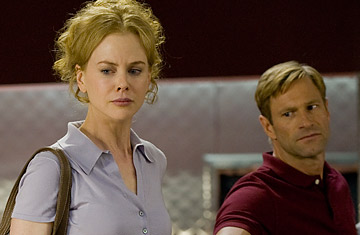
Nicole Kidman and Aaron Eckhart in Rabbit Hole
(2 of 3)
4. Essential Killing
A week ago at the Venice Film Festival, Vincent Gallo was named Best Actor and director Jerzy Skolimowski took the third-place Grand Jury Prize for this parable of a lone man in a desperate situation. As played by Gallo in an expressively wordless performance, Mohammed could be akin to the trapped mountaineer in 127 Hours, but with a political agenda and more blood on his hands. An Afghan who is captured by the invasion forces and is to be taken to an East European prison for rendition, Mohammed is utterly out of his element: a hot-weather creature in a vast expanse of snow. Yet he escapes his captors and stays alive by any means necessary. Skolimowski, who began his career as an auteur 50 years ago and has directed exemplary films in Polish (Barrier), French (Le Départ) and English (Deep End), doesn't seem to care if viewers are sympathetic to Mohammed. He wants them to feel the chill of mortality, which can be forestalled only by extreme measures. If survival is essential in a time of war, says this bleak, powerful film, so is killing. —M.C.
5. The Sleeping Beauty
With three decades' worth of provocative films (A Real Young Girl, Fat Girl, Anatomy of Hell), Catherine Breillat has proved herself a naughty transgressor of sexual boundaries. Lately, she has turned even more perverse by retelling children's fables with not nudity but an impishly clinical humor. Last year Breillat had a swipe at Bluebeard; now, in another film that played Venice before arriving in Toronto, she tilts Charles Perrault's fable of the princess with the hundred-year snooze. Her version is both closer to the Perrault particulars than the Disney version (of course) and more imaginatively revisionist. The original three fairies are here to loom over Princess Anastasia's bed. But when the youngest proposes that the girl "be pricked by a yew thistle at 6, sleep for 10 years and wake up at 16" and is asked, "What's the point of that?," she replies sagely, "Childhood lasts too long." This film doesn't; it's over in 80 minutes, yet it's got an adventure in the cave of a pustulant troll, a magical train ride and a tentative romance between Anastasia and a peasant boy that makes this a French kissing cousin to Let Me In. —R.C.
6. Miral
Sometimes moviemakers don't know where their story is. Julian Schnabel, the artist turned filmmaker (The Diving Bell and the Butterfly), had a wealth of dramatic, not to say tragic, material in this history of Palestine from 1947 to 1994 that centers on a home and school for displaced Palestinian girls. He begins pertinently with a quick biography of the school's founder, Hind Husseini (handsomely embodied by Israeli actress Hiam Abbass, who played the mother in The Visitor). The emotional heft of Husseini's heroism almost outweighs the try-anything directorial style, which is all quick cuts and motion-sickness camera instability. Then Schnabel finds what he thinks is his main tale — of the schoolgirl Miral (Slumdog Millionaire's Freida Pinto), who becomes radicalized as she matures — and the movie degenerates into visual sloganeering. Israeli police are awful because they're ugly; Palestinians are pure and noble because they look like Indian fashion models. (At Venice, where the film had its world premiere, audiences emerged from the screening to see posters of Pinto shilling for L'Oréal.) Even those sympathetic to the plight of the Palestinians should be annoyed by the black-and-white view here. Come on, don't make it so easy. —R.C.
